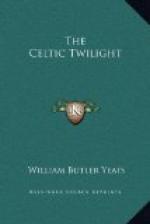My forebears and relations have lived near Rosses and Drumcliff these many years. A few miles northward I am wholly a stranger, and can find nothing. When I ask for stories of the faeries, my answer is some such as was given me by a woman who lives near a white stone fort—one of the few stone ones in Ireland—under the seaward angle of Ben Bulben: “They always mind their own affairs and I always mind mine”: for it is dangerous to talk of the creatures. Only friendship for yourself or knowledge of your forebears will loosen these cautious tongues. My friend, “the sweet Harp-String” (I give no more than his Irish name for fear of gaugers), has the science of unpacking the stubbornest heart, but then he supplies the potheen-makers with grain from his own fields. Besides, he is descended from a noted Gaelic magician who raised the “dhoul” in Great Eliza’s century, and he has a kind of prescriptive right to hear tell of all kind of other-world creatures. They are almost relations of his, if all people say concerning the parentage of magicians be true.
THE THICK SKULL OF THE FORTUNATE
I
Once a number of Icelandic peasantry found a very thick skull in the cemetery where the poet Egil was buried. Its great thickness made them feel certain it was the skull of a great man, doubtless of Egil himself. To be doubly sure they put it on a wall and hit it hard blows with a hammer. It got white where the blows fell but did not break, and they were convinced that it was in truth the skull of the poet, and worthy of every honour. In Ireland we have much kinship with the Icelanders, or “Danes” as we call them and all other dwellers in the Scandinavian countries. In some of our mountainous and barren places, and in our seaboard villages, we still test each other in much the same way the Icelanders tested the head of Egil. We may have acquired the custom from those ancient Danish pirates, whose descendants the people of Rosses tell me still remember every field and hillock in Ireland which once belonged to their forebears, and are able to describe Rosses itself as well as any native. There is one seaboard district known as Roughley, where the men are never known to shave or trim their wild red beards, and where there is a fight ever on foot. I have seen them at a boat-race fall foul of each other, and after much loud Gaelic, strike each other with oars. The first boat had gone aground, and by dint of hitting out with the long oars kept the second boat from passing, only to give the victory to the third. One day the Sligo people say a man from Roughley was tried in Sligo for breaking a skull in a row, and made the defence not unknown in Ireland, that some heads are so thin you cannot be responsible for them. Having turned with a look of passionate contempt towards the solicitor who was prosecuting, and cried, “that little fellow’s skull if ye were to hit it would go like an egg-shell,” he beamed upon the judge, and said in a wheedling voice, “but a man might wallop away at your lordship’s for a fortnight.”




